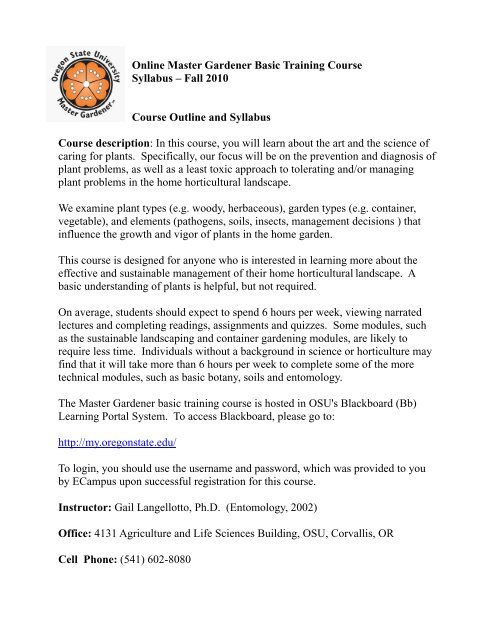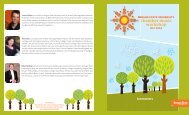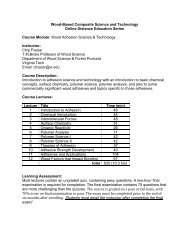Online Master Gardener Basic Training Course - Oregon State ...
Online Master Gardener Basic Training Course - Oregon State ...
Online Master Gardener Basic Training Course - Oregon State ...
Create successful ePaper yourself
Turn your PDF publications into a flip-book with our unique Google optimized e-Paper software.
<strong>Online</strong> <strong>Master</strong> <strong>Gardener</strong> <strong>Basic</strong> <strong>Training</strong> <strong>Course</strong><br />
Syllabus – Fall 2010<br />
<strong>Course</strong> Outline and Syllabus<br />
<strong>Course</strong> description: In this course, you will learn about the art and the science of<br />
caring for plants. Specifically, our focus will be on the prevention and diagnosis of<br />
plant problems, as well as a least toxic approach to tolerating and/or managing<br />
plant problems in the home horticultural landscape.<br />
We examine plant types (e.g. woody, herbaceous), garden types (e.g. container,<br />
vegetable), and elements (pathogens, soils, insects, management decisions ) that<br />
influence the growth and vigor of plants in the home garden.<br />
This course is designed for anyone who is interested in learning more about the<br />
effective and sustainable management of their home horticultural landscape. A<br />
basic understanding of plants is helpful, but not required.<br />
On average, students should expect to spend 6 hours per week, viewing narrated<br />
lectures and completing readings, assignments and quizzes. Some modules, such<br />
as the sustainable landscaping and container gardening modules, are likely to<br />
require less time. Individuals without a background in science or horticulture may<br />
find that it will take more than 6 hours per week to complete some of the more<br />
technical modules, such as basic botany, soils and entomology.<br />
The <strong>Master</strong> <strong>Gardener</strong> basic training course is hosted in OSU's Blackboard (Bb)<br />
Learning Portal System. To access Blackboard, please go to:<br />
http://my.oregonstate.edu/<br />
To login, you should use the username and password, which was provided to you<br />
by ECampus upon successful registration for this course.<br />
Instructor: Gail Langellotto, Ph.D. (Entomology, 2002)<br />
Office: 4131 Agriculture and Life Sciences Building, OSU, Corvallis, OR<br />
Cell Phone: (541) 602-8080
E-mail: gail.Langellotto@oregonstate.edu<br />
Please note: the *best* way to contact your instructor is via the discussion board<br />
on the Blackboard course page.<br />
Text: Sustainable Gardening: the <strong>Oregon</strong>-Washington <strong>Master</strong> <strong>Gardener</strong> Handbook.<br />
OSU Extension Publication EM 8742.<br />
Electronic versions of the assigned readings from the text will be posted on the<br />
Blackboard <strong>Course</strong> page. A hard copy of the entire Sustainable Gardening text<br />
may be purchased for $30.00 from OSU’s Extension Service Publication and<br />
Multimedia Catalog:<br />
http://extension.oregonstate.edu/catalog/index.php<br />
Simply use the search function to locate EM 8742.<br />
Objectives: My goals in teaching this course include introducing students to the<br />
basic terms, concepts and practices associated with installing and maintaining a<br />
home garden in a manner that is both successful and sustainable. Here, a<br />
‘successful garden’ is defined a garden that meets the needs and expectations of the<br />
gardener. Similarly, a ‘sustainable garden’ is defined as one where the gardener is<br />
able to meet these needs and expectations, without compromising the ability of<br />
future generations to meet their own needs (modified from the definition of<br />
sustainable development, in: United Nations. 1987. "Report of the World<br />
Commission on Environment and Development." General Assembly Resolution<br />
42/187, 11 December 1987. Retrieved: 2008-08-30). Ultimately, I hope to equip<br />
students with information and ways of thinking that will enable them to make<br />
informed decisions about their choice of plant materials and management approach<br />
in the garden.<br />
Method of Instruction: Narrated Power Point Lectures, Readings, Assignments,<br />
Quizzes, Supporting Web Materials, Internet Threaded Discussions, Final Exam.<br />
Policy on Class Participation: It is up to the student whether s/he chooses to<br />
actively participate in class via the completion of readings, assignments, quizzes<br />
and discussion. All of these are optional, and students will not be formally graded<br />
on their performance of these tasks. However, you are likely to acquire and retain<br />
more knowledge, and to enjoy your online learning experience more, if you are<br />
actively engaged in the course. Thus, students are STRONGLY encouraged to
complete all readings and assignments, to challenge themselves with the quiz, and<br />
to post or respond to posts on the discussion board on a weekly basis.<br />
Final Exam: There will be a single, open book and open note final exam for this<br />
course. In order to earn your Certificate of Home Horticulture, you must earn a<br />
70% or above on this exam.<br />
The final exam will be available to students, beginning at8:00am, Pacific Standard<br />
Time, on November 15, 2010. Access to the final exam will end at 11:55 pm,<br />
Pacific Standard Time on November 21, 2010. During this time, all course<br />
modules will be open and available for student use.<br />
Like the quizzes associated with each module, the final exam format is multiple<br />
choice, true/false, matching and short answer. However, where the quizzes are<br />
between 10 and 20 questions in length, the final exam is between 80-100 questions<br />
in length.<br />
The goal of the final exam is not to test how well you can remember items<br />
presented during the course, but to instead test how well you can carefully consider<br />
a question and utilize proper resource materials to formulate an answer.<br />
Thus, you are allowed and encouraged to use all course materials, including<br />
lectures, readings, previous assignments and previous quizzes to help you complete<br />
the final exam. You may also use the PNW Handbooks and other OSU Extension<br />
materials to complete the final exam.<br />
PNW Plant Disease URL: http://plant-disease.ippc.orst.edu/<br />
PNW Weeds URL: http://weeds.ippc.orst.edu/pnw/weeds<br />
PNW Insects URL: http://insects.ippc.orst.edu/pnw/insects<br />
OSU Extension Publications: http://extension.oregonstate.edu/catalog/<br />
If you earn less than 70% on your first attempt at the Final Exam, you must make<br />
an appointment to discuss your results with the instructor. You will then be given<br />
one chance to retake the exam. If you score less than 70% on this second attempt,<br />
you will not earn your Certificate of Home Horticulture, as you will not have<br />
successfully completed the requirements for this course.<br />
<strong>Online</strong> Social Networking: Students come to the online <strong>Master</strong> <strong>Gardener</strong> course<br />
from a range of professional backgrounds and with a variety of knowledge that can<br />
enhance the learning experience of their class. Students with questions are thus
encouraged to share these questions with the entire class, via the Blackboard<br />
Discussion Forum. Likewise, students are encouraged to regularly check the<br />
Discussion Forum, and to read and respond to their classmates’ postings.<br />
Facebook TM is a social utility that allows users to connect with friends and family<br />
across the globe. I regularly use Facebook to keep in touch with my overseas<br />
friends, and with my family on the east coast of the United <strong>State</strong>s. Via Facebook, I<br />
have also gotten to know several of the students who have taken the <strong>Master</strong><br />
<strong>Gardener</strong> <strong>Online</strong> basic training course.<br />
You may find it enjoyable to get to know your classmates outside of the<br />
Blackboard Learning Portal System. A Facebook group has been set up for the<br />
<strong>Oregon</strong> <strong>Master</strong> <strong>Gardener</strong> Program:<br />
http://tiny.cc/zhhl9<br />
In addition, news articles and upcoming events that feature or may be of interest to<br />
<strong>Oregon</strong> <strong>Master</strong> <strong>Gardener</strong>s, are posted on the OSU (<strong>Oregon</strong>) <strong>Master</strong> <strong>Gardener</strong><br />
Facebook Fan page:<br />
http://tiny.cc/7t8ki<br />
You will need a Facebook account to access these pages, as well as the other<br />
features of Facebook. These features include: photo sharing, video sharing, virtual<br />
bookshelf and a variety of games that you can play, online, with friends and family.<br />
ADA Students: Students who qualify for assistance under the ADA should notify<br />
the instructor the first week of class if they require assistance in the course. It is the<br />
student's responsibility to inform the instructor of his/her needs.<br />
Module Availability: <strong>Course</strong> modules will be made available to students by<br />
8:00am (PST) of the day on which a specific module begins. Once modules are<br />
made available to students, the modules and their associated content will remain<br />
open and available for the duration of the course. Thus, Module 2 (Soils and<br />
Fertilizers) will be available, beginning at 8:00am on September 6 th and continuing<br />
through the close of this course, at 11:55pm Pacific Standard Time (PST) on<br />
December 5 th . Module 5 (Plant Pathology) will be available, beginning at 8:00am<br />
on September 27 th , and continuing through the close of the course at 11:55pm<br />
(PST) on December 5 th .
Missed Classes: Because course modules will remain open during and after the<br />
week for which they are scheduled (through 11:55pm PST on December 5 th , 2010)<br />
you will be able to make up any coursework that you might have missed. Simply<br />
work through the missed module at your own pace. Remember, your completion<br />
of quizzes, readings and assignments is optional, but is strongly encouraged, so<br />
that you can better learn and integrate the content of this course.<br />
Notice: The contents of this syllabus are subject to change in the event of<br />
extenuating circumstances, or if the instructor deems it necessary.
<strong>Course</strong> Schedule<br />
Week of<br />
Module<br />
#<br />
Module Name<br />
Reading<br />
August 30 –<br />
September 5<br />
September 6 –<br />
September 12<br />
September 13 –<br />
September 19<br />
September 20–<br />
September 26<br />
September 27 –<br />
October 3<br />
October 4 –<br />
October 10<br />
1 Botany <strong>Basic</strong>s VanderZanden, A. M. 2004. Botany <strong>Basic</strong>s. Chapter 1 in Sustainable Gardening. The <strong>Oregon</strong>-<br />
Washington <strong>Master</strong> <strong>Gardener</strong> Handbook. <strong>Oregon</strong> <strong>State</strong> University Extension Service<br />
Publication EM8742.<br />
2 Soils and<br />
Fertilizers<br />
3 Vegetable<br />
Gardening<br />
4 Introduction to<br />
Entomology<br />
Cogger, C. 2004. Soils and fertilizers. Chapter 2 in Sustainable Gardening. The <strong>Oregon</strong>-<br />
Washington <strong>Master</strong> <strong>Gardener</strong> Handbook. <strong>Oregon</strong> <strong>State</strong> University Extension Service<br />
Publication EM8742.<br />
Cogger, C. 2004. Composting. Chapter 5 in Sustainable Gardening. The <strong>Oregon</strong>-Washington<br />
<strong>Master</strong> <strong>Gardener</strong> Handbook. <strong>Oregon</strong> <strong>State</strong> University Extension Service Publication EM8742.<br />
Patterson, P. 2004. Vegetable Gardening. Chapter 7 in Sustainable Gardening. The <strong>Oregon</strong>-<br />
Washington <strong>Master</strong> <strong>Gardener</strong> Handbook. <strong>Oregon</strong> <strong>State</strong> University Extension Service<br />
Publication EM8742.<br />
Antonelli, A. 2004. <strong>Basic</strong> Entomology. Chapter 14 in Sustainable Gardening. The <strong>Oregon</strong>-<br />
Washington <strong>Master</strong> <strong>Gardener</strong> Handbook. <strong>Oregon</strong> <strong>State</strong> University Extension Service<br />
Publication EM8742.<br />
5 Plant Pathology Pscheidt, J. W. 2004. Plant Disease. Chapter 15 in Sustainable Gardening. The <strong>Oregon</strong>-<br />
Washington <strong>Master</strong> <strong>Gardener</strong> Handbook. <strong>Oregon</strong> <strong>State</strong> University Extension Service<br />
Publication EM8742<br />
6 Sustainable<br />
Landscaping<br />
***OPTIONAL*** McNeilan, J. 2004. Sustainable Landscape Design. Chapter 21 in<br />
Sustainable Gardening. The <strong>Oregon</strong>-Washington <strong>Master</strong> <strong>Gardener</strong> Handbook. <strong>Oregon</strong> <strong>State</strong><br />
University Extension Service Publication EM8742<br />
October 11 –<br />
October 17<br />
7 Container<br />
Gardening<br />
***This reading is optional, because it is currently in revision. We are not pleased with the<br />
current state of this chapter, and are working to get a new version published, asap.<br />
McNeilan, R. (editor). 2004. Plant Propagation. Chapter 3 in Sustainable Gardening. The<br />
<strong>Oregon</strong>-Washington <strong>Master</strong> <strong>Gardener</strong> Handbook. <strong>Oregon</strong> <strong>State</strong> University Extension Service<br />
Publication EM8742.<br />
Pinyuh, G., Antonellie, A. L. and Collman, S. J. 2004. Houseplants. Chapter 13 in Sustainable<br />
Gardening. The <strong>Oregon</strong>-Washington <strong>Master</strong> <strong>Gardener</strong> Handbook. <strong>Oregon</strong> <strong>State</strong> University<br />
Extension Service Publication EM8742.
October 18 –<br />
October 24<br />
October 25 –<br />
October 31<br />
November 1 –<br />
November 7<br />
November 8 –<br />
November 14<br />
8 Herbaceous<br />
Ornamentals<br />
9 Understanding<br />
Pesticides<br />
10 Integrated Pest<br />
Management<br />
11 Woody<br />
Landscape Plants<br />
Robson, M. 2004. Herbaceous Ornamental Plants. Chapter 8 in Sustainable Gardening. The<br />
<strong>Oregon</strong>-Washington <strong>Master</strong> <strong>Gardener</strong> Handbook. <strong>Oregon</strong> <strong>State</strong> University Extension Service<br />
Publication EM8742.<br />
Shenk, M. (editor). 2004. Understanding Pesticides. Chapter 19 in Sustainable Gardening. The<br />
<strong>Oregon</strong>-Washington <strong>Master</strong> <strong>Gardener</strong> Handbook. <strong>Oregon</strong> <strong>State</strong> University Extension Service<br />
Publication EM8742.<br />
Gredler, G. 2004. Integrated Pest Management. Chapter 20 in Sustainable Gardening. The<br />
<strong>Oregon</strong>-Washington <strong>Master</strong> <strong>Gardener</strong> Handbook. <strong>Oregon</strong> <strong>State</strong> University Extension Service<br />
Publication EM8742.<br />
Green, J. L., O. Maloy and J. Capizzi. 2004. Diagnosing Plant Problems. Chapter 16 in<br />
Sustainable Gardening. The <strong>Oregon</strong>-Washington <strong>Master</strong> <strong>Gardener</strong> Handbook. <strong>Oregon</strong> <strong>State</strong><br />
University Extension Service Publication EM8742<br />
Maleike, R. 2004. Woody Landscape Plants. Chapter 9 in Sustainable Gardening. The <strong>Oregon</strong>-<br />
Washington <strong>Master</strong> <strong>Gardener</strong> Handbook. <strong>Oregon</strong> <strong>State</strong> University Extension Service<br />
Publication EM8742.<br />
November 15 –<br />
November 21<br />
FINAL<br />
EXAM<br />
Comprehensive<br />
McNeilan, R. 2004. Pruning. Chapter 4 in Sustainable Gardening. The <strong>Oregon</strong>-Washington<br />
<strong>Master</strong> <strong>Gardener</strong> Handbook. <strong>Oregon</strong> <strong>State</strong> University Extension Service Publication EM8742.<br />
None.<br />
November 22-28<br />
THANKSGIVING BREAK. No new modules will become available this week. Please use this time to relax, and<br />
to download any course notes, lectures, readings, etc. that you would like to keep for your records.<br />
November 29 –<br />
December 5<br />
**OPTIONAL**<br />
12 OSU <strong>Master</strong><br />
<strong>Gardener</strong><br />
Program<br />
End of <strong>Course</strong><br />
Business<br />
Langellotto, G.A., VanderZanden, A. M., McNeilan, J. and McNeilan, R. 2010. An<br />
introduction to being a master gardener volunteer. <strong>Oregon</strong> <strong>State</strong> University Extension Service<br />
Publication EM 8749.<br />
****Note: This module is optional, and for those who would like to learn<br />
more about the OSU Extension <strong>Master</strong> <strong>Gardener</strong> Program.<br />
This week also serves to answer any questions or take care of any end of<br />
course business, prior to the closing of the Blackboard <strong>Course</strong> page, on<br />
December 5, 2010 at 11:55pm (PST).




